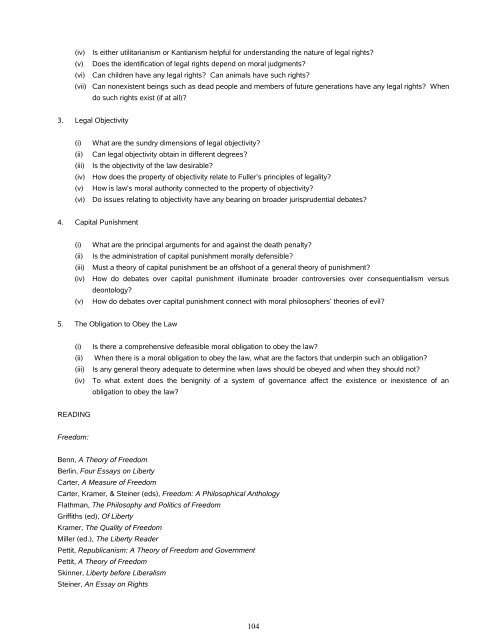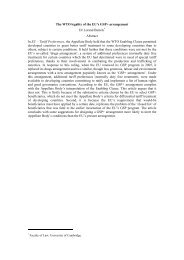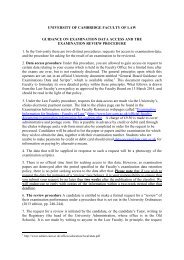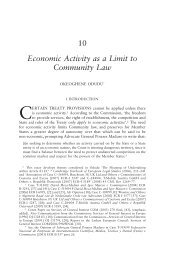(iv)(v)(vi)(vii)Is either utilitarianism or Kantianism helpful for understanding the nature <strong>of</strong> legal rights?Does the identification <strong>of</strong> legal rights depend on moral judgments?Can children have any legal rights? Can animals have such rights?Can nonexistent beings such as dead people and members <strong>of</strong> future generations have any legal rights? Whendo such rights exist (if at all)?3. Legal Objectivity(i)(ii)(iii)(iv)(v)(vi)What are the sundry dimensions <strong>of</strong> legal objectivity?Can legal objectivity obtain in different degrees?Is the objectivity <strong>of</strong> the law desirable?How does the property <strong>of</strong> objectivity relate to Fuller’s principles <strong>of</strong> legality?How is law’s moral authority connected to the property <strong>of</strong> objectivity?Do issues relating to objectivity have any bearing on broader jurisprudential debates?4. Capital Punishment(i)(ii)(iii)(iv)(v)What are the principal arguments for and against the death penalty?Is the administration <strong>of</strong> capital punishment morally defensible?Must a theory <strong>of</strong> capital punishment be an <strong>of</strong>fshoot <strong>of</strong> a general theory <strong>of</strong> punishment?How do debates over capital punishment illuminate broader controversies over consequentialism versusdeontology?How do debates over capital punishment connect with moral philosophers’ theories <strong>of</strong> evil?5. The Obligation to Obey the <strong>Law</strong>(i) Is there a comprehensive defeasible moral obligation to obey the law?(ii) When there is a moral obligation to obey the law, what are the factors that underpin such an obligation?(iii) Is any general theory adequate to determine when laws should be obeyed and when they should not?(iv) To what extent does the benignity <strong>of</strong> a system <strong>of</strong> governance affect the existence or inexistence <strong>of</strong> anobligation to obey the law?READINGFreedom:Benn, A Theory <strong>of</strong> FreedomBerlin, Four Essays on LibertyCarter, A Measure <strong>of</strong> FreedomCarter, Kramer, & Steiner (eds), Freedom: A Philosophical AnthologyFlathman, The Philosophy and Politics <strong>of</strong> FreedomGriffiths (ed), Of LibertyKramer, The Quality <strong>of</strong> FreedomMiller (ed.), The Liberty ReaderPettit, Republicanism: A Theory <strong>of</strong> Freedom and GovernmentPettit, A Theory <strong>of</strong> FreedomSkinner, Liberty before LiberalismSteiner, An Essay on Rights104
Van Hees, Legal Reductionism and FreedomRights:Cruft, ‘Beyond the Interest Theory and Will Theory’Edmundson, An Introduction to RightsFeinberg, ‘The Rights <strong>of</strong> Animals and Unborn Generations’Finnis, Natural <strong>Law</strong> and Natural Rights, chap 8Hohfeld, Fundamental Legal ConceptionsJones, RightsKramer, Simmonds, and Steiner, A Debate over RightsKramer, ‘Getting Rights Right’MacCormick, ‘Children's Rights’Raz, The Morality <strong>of</strong> FreedomSumner, The Moral Foundations <strong>of</strong> RightsThomson, The Realm <strong>of</strong> RightsWaldron, The Right to Private PropertyWaldron (ed), Theories <strong>of</strong> RightsWellman, A Theory <strong>of</strong> RightsWenar, ‘The Nature <strong>of</strong> Rights’Legal Objectivity:Dworkin, A Matter <strong>of</strong> PrincipleDworkin, ‘Objectivity and Truth’Greenawalt, <strong>Law</strong> and ObjectivityHonderich (ed), Morality and ObjectivityKramer, Objectivity and the Rule <strong>of</strong> <strong>Law</strong>Leiter, Naturalizing JurisprudenceLeiter (ed), Objectivity in <strong>Law</strong> and MoralsMarmor (ed), <strong>Law</strong> and InterpretationMarmor, Positive <strong>Law</strong> and Objective ValuesNagel, The View from NowhereRosati, ‘Some Puzzles about the Objectivity <strong>of</strong> <strong>Law</strong>’Schauer, Playing by the RulesStavropoulos, Objectivity in <strong>Law</strong>Capital Punishment:Bedau, The Death Penalty in AmericaBedau and Cassell (eds), Debating the Death PenaltyBerns, For Capital PunishmentDavis, Justice in the Shadow <strong>of</strong> DeathDolinko, ‘Foreword: How to Criticize the Death Penalty’Haas and Inciardi (eds), Challenging Capital PunishmentNathanson, An Eye for an EyePojman and Reiman, The Death PenaltyPrimoratz, Justifying Legal Punishment105
- Page 2 and 3:
ContentsGeneral InformationOfficers
- Page 4 and 5:
Settlement of International Dispute
- Page 6 and 7:
Faculty AdministrationFaculty Offic
- Page 8 and 9:
The Faculty of LawLaw has been stud
- Page 10 and 11:
The LLM Degree. This degree is awar
- Page 12 and 13:
Opening Hours:Full Term: Monday to
- Page 14 and 15:
Rules Made by the Information Strat
- Page 16 and 17:
The Lauterpacht Centre for Internat
- Page 18 and 19:
Centre for Corporate and Commercial
- Page 20 and 21:
Cambridge Socio-Legal GroupThe Camb
- Page 26 and 27:
Dates of Faculty Board Meetings7 Oc
- Page 28 and 29:
Proceed with caution in reaching fo
- Page 30 and 31:
Faculty CommunicationEach year, the
- Page 32 and 33:
Law Tripos Part IA. A candidate for
- Page 34 and 35:
Prizes. The following prizes may be
- Page 36 and 37:
PAPER 2. CONSTITUTIONAL LAWA. The a
- Page 38 and 39:
Oliver, Constitutional Reform (2003
- Page 40 and 41:
Hedley, Tort (6th ed 2008)Weir, An
- Page 42 and 43:
3. Trusts and co-ownership: Concurr
- Page 44 and 45:
Brownlie, Principles of Internation
- Page 46 and 47:
Elliott, Constitutional Foundations
- Page 48 and 49:
Contract: covenant and debt; assump
- Page 50 and 51:
Statutes:Blackstone’s Statutes on
- Page 52 and 53:
For reference:Birks and Pretto (ed)
- Page 54 and 55: Foster, EU Legislation (2010-2011)B
- Page 56 and 57: PAPER 42. INTELLECTUAL PROPERTY1. I
- Page 58 and 59: 2. Property torts (conversion and t
- Page 60 and 61: (iii)Causation4. Contracts in Engla
- Page 62 and 63: Rawls, Political LiberalismRawls, J
- Page 64 and 65: Rodger and McCulloch, The UK Compet
- Page 66 and 67: Law Commission, Renting Homes: The
- Page 68 and 69: Human Rights Case DigestHuman Right
- Page 70 and 71: 3. Title at common law and in equit
- Page 72 and 73: Exemption from Professional Examina
- Page 74 and 75: Paper application available to down
- Page 76 and 77: Form of Examination and Designation
- Page 78 and 79: ‘Open Book’ Papers. Where a pap
- Page 80 and 81: LLM : Syllabuses and Lists of Recom
- Page 82 and 83: ased upon one or two leading cases,
- Page 84 and 85: Goff and Jones, The Law of Restitut
- Page 86 and 87: Butterworths’ Company Law Handboo
- Page 88 and 89: 2. The EU’s system for human righ
- Page 90 and 91: the context of environmental protec
- Page 92 and 93: European Competition Law Review (EC
- Page 94 and 95: Crawford, The Treatment of Combatan
- Page 96 and 97: Douglas, The International Law of I
- Page 98 and 99: Unger, Free Trade Reimagined (2007)
- Page 100 and 101: 3. Sceptics and Critics I4. Sceptic
- Page 102 and 103: The course provides an opportunity
- Page 106 and 107: Reiman, ‘Justice, Civilization, a
- Page 108 and 109: Gardner, Introduction to the Law of
- Page 110 and 111: 1. Types of theoretical analysis an
- Page 112 and 113: 2. Specific fieldsTopics to be sele
- Page 114 and 115: The LLM (one-year taught postgradua
- Page 116 and 117: As part of the requirements for the
- Page 118 and 119: Teaching Members of the Faculty of
- Page 120 and 121: MC Elliott, MA, PhD (Cantab); St Ca
- Page 122 and 123: RA Melikan, BA (Mich), JD, MA (Chi)
- Page 124 and 125: BD Sloan, MA, LLM (Cantab); King’
- Page 126 and 127: Law Teachers in the Department of L
- Page 128 and 129: Murray Edwards College. Dr S Turenn
















